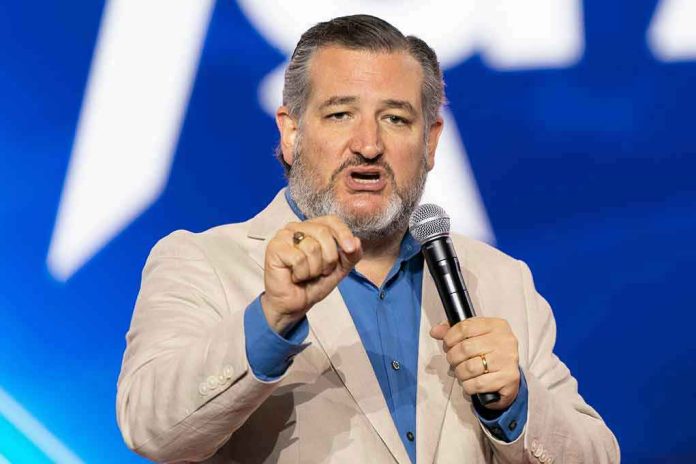
Senator Ted Cruz denounced the FCC’s role in Jimmy Kimmel’s suspension as “unbelievably dangerous,” highlighting alarming government overreach into media content that threatens free speech principles.
Story Snapshot
- Ted Cruz condemns FCC involvement in Kimmel’s suspension as dangerous government overreach
- ABC temporarily paused “Jimmy Kimmel Live” following controversial comments about Charlie Kirk
- FCC officials made public statements suggesting continued scrutiny of broadcast content
- Constitutional concerns emerge over federal agency influence on private media decisions
Cruz Condemns Federal Broadcasting Interference
Senator Ted Cruz issued a stern rebuke of the Federal Communications Commission’s involvement in ABC’s decision to suspend “Jimmy Kimmel Live.” Cruz characterized the agency’s actions as “unbelievably dangerous,” warning that federal interference in broadcast content decisions represents a troubling expansion of government power. The Texas senator’s criticism comes as constitutional scholars raise questions about the appropriate boundaries between federal regulatory authority and media independence in the current political climate.
ABC Suspends Popular Late-Night Program
ABC network temporarily pulled “Jimmy Kimmel Live” from its programming schedule following controversial comments made by the host regarding Charlie Kirk and other political figures. The suspension occurred after mounting pressure from various sources, including apparent communication with federal regulators. Network executives cited the need to review content standards and assess potential violations of broadcasting guidelines. While ABC reinstated Kimmell as of Tuesday, the initial decision still marks a significant escalation in the ongoing tensions between entertainment programming and political commentary oversight.
FCC Signals Continued Content Monitoring
Federal Communications Commission officials publicly indicated their regulatory review extends beyond the Kimmel situation, with statements suggesting the agency is “not done yet” in examining broadcast content. This unprecedented level of federal involvement in programming decisions raises constitutional questions about First Amendment protections and government censorship. The FCC’s expanded interpretation of its regulatory role appears to signal a more aggressive approach to content oversight than previously seen in recent decades.
Constitutional Implications for Media Freedom
Legal experts express concern that the FCC’s actions establish a dangerous precedent for federal control over private media content decisions. The agency’s public pressure campaign against specific programming represents a departure from traditional regulatory boundaries that protected editorial independence. Conservative constitutional scholars argue this government interference undermines the fundamental principle of free speech, regardless of political viewpoints expressed. The situation demonstrates how federal agencies can effectively censor content through regulatory intimidation rather than direct legal action.





